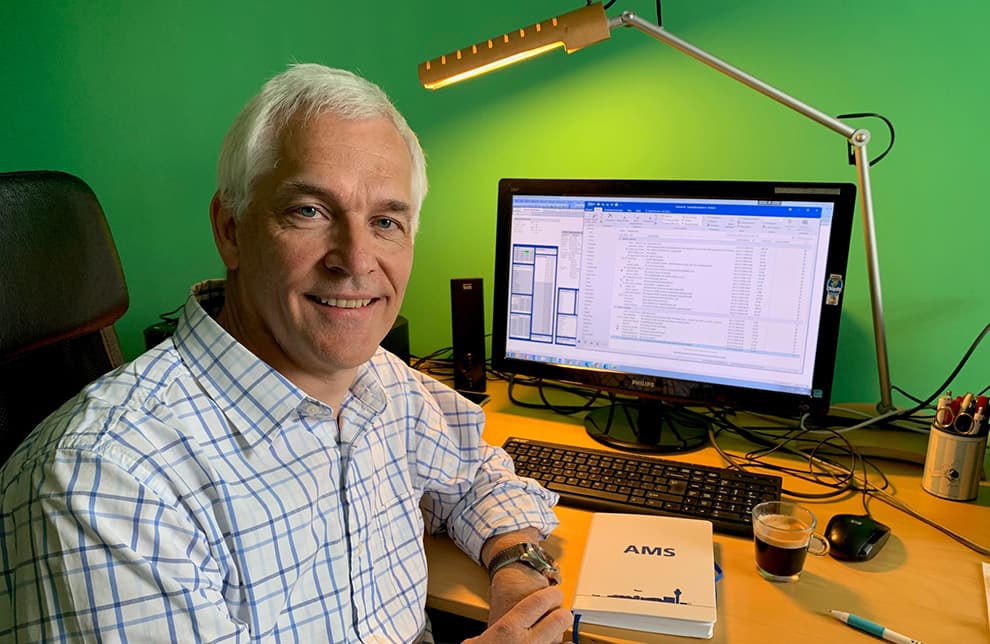Route Development in the Time of Coronavirus
After more than 25 years in the aviation industry, Wilco Sweijen thought he’d seen it all. From SARS and MERS to 9/11 to volcanoes erupting in Iceland. But the coronavirus pandemic is something we’ve never seen before, and hopefully will never see again. What does an expert in Route and Business Development do when so much air traffic is grounded? Well, he certainly doesn’t sit still.

Gepubliceerd op: 12 mei 2020
Unprecedented times
Compared to 2019, Schiphol is managing around 11% of the average number of aircraft movements, and 3% of the average passenger numbers since the corona crisis began. The devastating effects of the pandemic are having a major impact on the aviation industry. But as always, Wilco’s focus is entirely on the airlines.
‘In the first few weeks after the crisis began, Schiphol was completely focused on understanding and coping with the enormous impact it was having,’ Wilco says. ‘Every day, new developments, new cancellations and new government measures were being announced, and we spent a lot of time communicating with airlines to figure out how to help. We were all in unchartered territory. Previous challenges were localised to a particular country or region. But this is a truly global challenge. Every country is affected at the same time.’
Protecting the core
Now several weeks later, Schiphol is still operating at a ‘core’ level: two piers remain open for the passenger flights carrying essential travellers back home and Dutch citizens returning home from foreign countries. ‘It’s now as important as ever to be certain which flights are still scheduled to arrive. We’re working closely with the operations team to assist on airlines’ day-to-day operational needs. We want to be there for the airlines that are carrying out these essential flights,’ Wilco explains.
‘At the same time, we see an increase in cargo flights to Amsterdam, also with passenger aircraft. This also needs to be processed in an efficient way. So we collaborate with the cargo team to offer airlines guidance on how to arrange all-cargo flights with passenger aircraft.’
Behind the scenes
In the meantime, Wilco is still the airlines’ #1 advocate. ‘As Schiphol discusses possible scenarios for the continuing crisis and the eventual recovery, we make sure that the airlines’ needs stay top of mind. Whatever recovery scenario we execute, we will make sure that it’s in the best interest of the airlines we serve.’
In the meantime, Schiphol is making every effort to support its airline partners. Including on the financial side. Arrangements are being made with regard to airport charges, real estate rent and the costs for parking non-operational aircraft.
In addition, Wilco also sees some opportunities in the midst of the crisis. ‘There will hopefully never be another time when operations at Schiphol are reduced so much. So we’re taking this time to complete as much essential maintenance and construction as possible, now that it is the least disruptive to passengers. The Core Schiphol scenario has led to the identification of 180 opportunities to complete maintenance work, as well as certain project elements, more quickly and efficiently over a two-month period.’
Like many other organisations, Schiphol is mindful of budgets, yet is planning short-term investments and creating capacity for the future. ‘We’re examining other aspects of our operations and identifying areas for improvement,’ Wilco says. ‘So that when we do come back, we can have an even better grip on the challenges of our industry: from sustainability to slot capacity, and from noise pollution to crowd control.’
Wilco is also working with national and local tourism boards to prepare for scenarios once the travel industry begins its recovery. ‘It’s most likely that there will be a period of limited travel capacity, and that the 1.5-metre society will continue for a while. So in addition to examining the safety measures needed within Schiphol, we’re talking with the Dutch and Amsterdam tourism boards to develop strategies that allow travellers to visit our country as safely as possible.’
Staying in touch
Wilco’s advice for airlines right now? Stay in touch, and stay hopeful. ‘We all just wish this would be over, and we could all just return to “normal”. But the fact of the matter is, the recovery will likely be long and challenging. The most important thing is to stay in touch with us. Let us know about your cancelled flights, come to us with your concerns, and share with us your expected plans for recovery,’ he encourages. ‘The more we know about when airlines plan to be operational again, or what they need from us to ease their recovery, the more we can help.’
Wilco also believes airlines and airports need to work together to regain passenger confidence. ‘There’s no guarantee that people will immediately start flying again, just because the airports re-open. We’re striving for pan-European, and hopefully global, regulations that reassure passengers that we’re doing everything we can to keep them safe. Only when travellers feel confident that we have measures in place and are enforcing them, will they start to feel good about travelling again.’
In the meantime, Wilco is as available as he’s always been. Only now, behind a desk at his home in Leiden instead of in his office at Schiphol. ‘I miss the travel most of all,’ he says. ‘A year ago, I couldn’t have imagined going an entire month without flying anywhere. Seeing my colleagues and partners in person is such an essential and enjoyable part of my job. So I look forward to the day when I’ll be able to visit my contacts again. Especially at events like Routes. But until then, I’ll keep working hard, and hoping that I get to see every one of my clients again, very soon.’